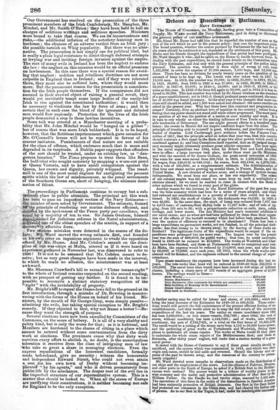Our Government has resolved on the prosecution of the three
prominent members of the Irish Confederacy, Mr. Meagher, Mr. Mitchel, and Mr. Smith O'Brien: they have been held to bail on charges of seditious writings and seditious speeches. Ministers Were bound to take that course. We see its inconvenience and risks,—the additional inflation of the notoriety-hunting men in buckram ; the chances of an adverse verdict from an Irish jury ; the possible tarnish on Whig popularity. But there was no alter- native. The prosecution is not simply one for political libel, but is really a plain legal resistance to direct though deferred attempts at levying war and inviting foreign invasion against the empire. The root of many evils in Ireland has been the neglect to enforce the law : the neglect on this occasion would be an official premium on lawlessness. In this case there was a special reason for avoid- ing that neglect : sedition and rebellious doctrines are not more culpable in England than in Ireland ; and if they were tolerated there, they must also be suffered here, where they would mean more. But the paramount reason for the prosecution is considera- tion for the Irish people themselves. If the conspirators did not succeed in their avowed object of raising a general revolt, they would yet inevitably tempt some large bodies of the easily-led Irish to rise against the constituted authorities ; it would then be necessary to vindicate the law by force of arms ; and it is certain that in such case the blood of the ignorant and deluded men would flow copiously. Protection for the lives of the Irish people demanded a stop to these lawless incentives. Some talk was uttered at a Manchester meeting of a proba- bility that Mr. John Mitchel would be " hanged on a gibbet " : but of course that was mere Irish balderdash. It is to be hoped, however, that the fictitious imprisonment which gave occasion for Mr. O'Connell's levees will not be repeated in favour of his coarser imitators. Punishments of that nature are not suitable for the class of offence, which embraces much that is mean and degraded in its turpitude. A Dublin paper suggests that offenders of the sort should be treated, under an existing law, as " dan- gerous lunatics." The Times proposes to treat them like Bean, the half-idiot who sought notoriety by snapping a worn-out pistol at Queen Victoria, and to have small conspirators against the Queen, her crown and dignity, privately whipped. The tread- mill is one of the most usual engines for castigating the peccant spirits within the law of misdemeanour, as the penal settlements of the Southern Ocean are, short of hanging, the ultimate desti- nation of felons.


























 Previous page
Previous page